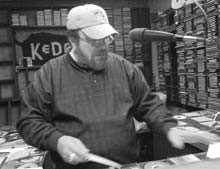Real-deal minority broadcasters face the threat of Big Media
| "They've dangled money in front of my mom, big time," says KEDA Program Director Richard Davila, whose mother owns the station. "If we sold the station, conjunto airplay would die here." (Photo by Mark Greenberg) |
"They've dangled money in front of my mom, big time," says KEDA program director Richard Davila, the son of station founder Manuel Davila, who died in 1997. "But I told her: 'Who's going to serve the community? Who's going to play Flaco, who's going to play all these other conjunto artists?' She said, 'Oh, they're all my friends.' If we sold the station, conjunto airplay would die here.'"
A fact often lost in the recent growth of Spanish-language broadcasting is that most radio and television stations tailored for Latinos are not owned by Latinos. The most obvious example is multi-media giant Univision. Last year, the company dramatically expanded its sphere of influence by acquiring Hispanic Broadcasting Corporation, which programs more than 60 radio stations in 15 of the 20 largest Hispanic markets in the United States. Univision's owner and CEO is Jerry Perenchio, a former Hollywood talent agent with no particular connection to the Latino community.
The issue of minority ownership is relevant to Latinos not only as a matter of political principle, but also because the tastes of Spanish-language listeners differ radically from one region to another. Yet most Latino-oriented stations fail to take this into account. Some listeners also complain that Spanish-language radio glamorizes crime and embraces attention-getting vulgarity.
"These stations, they're talking garbage during the morning drive-time hours and they're glorifying the drug dealers," says Placido Salazar, a former San Antonio radio DJ and cable-access TV host, who is sharply critical of media consolidation. "Unfortunately, the big bucks dictate what gets played. These guys are interested in money and they couldn't care less, and unfortunately, people go for that kind of junk."
Until recently, KEDA (known over the years as "La Caliente" and "Jalapeño") was the only Chicano-owned radio station in the San Antonio market. In 2003, however, Border Media - a South Texas company with radio stations in the Rio Grande Valley and Laredo - bought KLEY (94.1-FM) and KSAH (720 AM) from Spanish Broadcasting System, a chain owned by Cuban-American Raul Alarcon Jr. Border Media was founded by Houston businessman Thomas Castro and its initial investors included 2002 gubernatorial candidate Tony Sanchez.
Nonetheless, KEDA continues to stand out on the local radio dial because of its deep local ties. Although the Davila family also owns two radio stations in Corpus Christi and one in Bishop, the small scale and defining philosophy of their business keeps them uncommonly attuned to the needs of their listeners. For example, it's hard to imagine any local band taking one of its discs to a local rock station and hearing it on the radio the same day, but that's exactly what happens for conjunto and Tejano artists with KEDA.
While most Latino-oriented stations emphasize contemporary Tejano music, KEDA - which Davila calls "the first Tejano radio station in the world" - provides an outlet for the traditional sounds of bajo sexto and accordion, with conjunto mainstays such as the nightly Güero Polkas show.
"We have an open-door policy for all the artists," Davila says. "But of more importance to the FCC, we really do serve the community. The other ones might act like they do when the FCC is in town, running a lot of public service. But as soon as the FCC is out of the area, the service will stop.
"We announce plate sales to bury people. Where are you going to get that kind of community service? That sheriff's deputy, `Jesus` Garza, who got killed, they did a fish fry for him, and I didn't hear anybody else plugging it, but we announced that. We announce everything for the community and believe that's what our license means. We put that first and foremost, even over money."
Davila says that in the mid-'60s, his father actively researched what music was missing from the local airwaves. "He went to all the little towns around San Antonio - Uvalde, Seguin, New Braunfels, Pleasanton, Poteet - and they said, 'The only thing we don't hear on the radio is conjunto, and that's what we want to hear.'"
Salazar sees broadcast consolidation stripping away the elements that made Spanish-language radio a mouthpiece for the community.
"When one or two companies buy all the gasoline in the country, there's only one way that those prices are going to go, and that's up," he says. "It's the same thing with the media. They're drumming out the mom-and-pop radio stations that had to prove themselves by serving the public with PSAs `public service announcements` and stuff like that. Just listen to most radio stations and see how many PSAs you hear on there."
It's an issue that also concerns Marcelo Tafoya, former owner of five Spanish-language radio stations in Lubbock, Lampassas, and Austin. "With the big conglomerates, most of their advertising is national, so they don't need the local advertisers," Tafoya says. "And the conglomerate drives up the cost of ads, which means that local advertising has suffered. They're not only depriving the local businessman, they're depriving the public of that information." •


